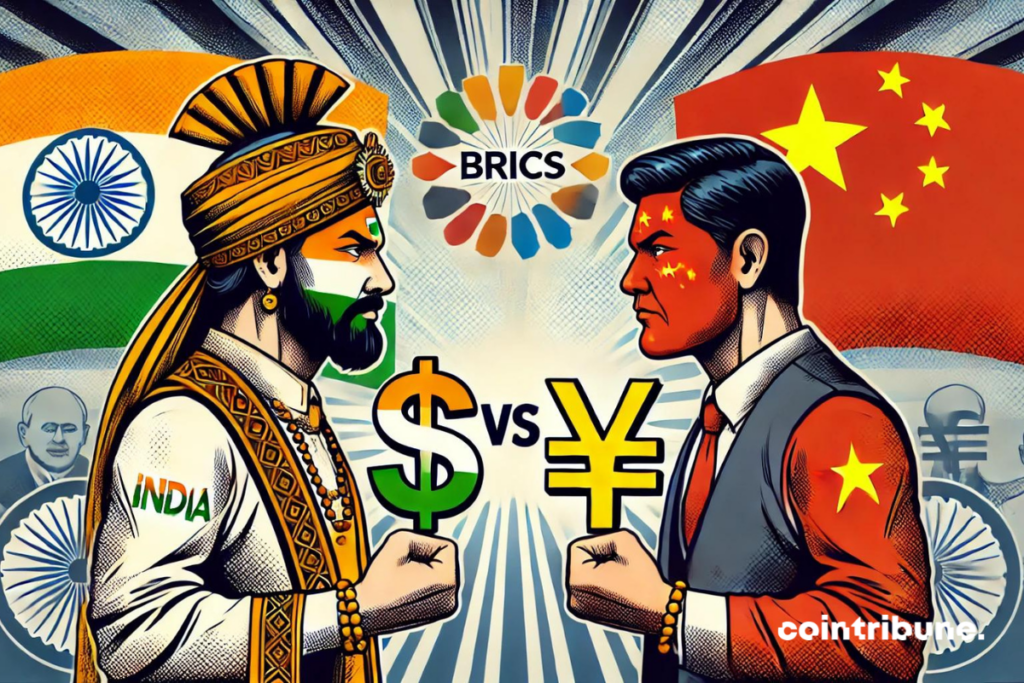BRICS: India Prefers the Dollar Over the Yuan!
The Shanghai Cooperation Organization (SCO) Summit 2024 was the scene of major geopolitical tensions. In a move that could redefine the dynamics of international trade, India officially rejected China’s proposal to replace the US dollar with the yuan for trade exchanges. This decision marks a significant turning point in the relationships among BRICS members. India’s firm stance reflects not only its economic concerns but also a growing distrust of China’s global ambitions.

India Rejects China’s De-dollarization Proposal
At the Shanghai Cooperation Organization (SCO) Summit 2024, China ramped up its efforts to promote de-dollarization, supported by Russia, by encouraging the use of local currencies, particularly the yuan, for international trade transactions. However, India firmly opposed this initiative, stating its intention to continue using the US dollar as the reference currency for its trade exchanges. Indian Prime Minister Narendra Modi, by sending Foreign Minister Subrahmanyam Jaishankar to represent him at this summit, clearly signaled his disagreement with the Chinese proposal.
Despite the savings made by using the yuan and the ruble to pay for Russian oil in 2022, India prefers to maintain the dollar for its future transactions. This decision stems partly from distrust of China’s economic intentions and a desire to preserve the dollar’s influence on the international stage. In response to Russia’s demands to settle oil purchases in yuan, India chose to reduce its imports of Russian oil and turn to the United States, paying in dollars.
How India’s Decision Shakes BRICS
India’s firm position against China’s proposed de-dollarization could have significant repercussions on global economic dynamics. By refusing to adopt the yuan for trade exchanges, India sends a clear message about its commitment to maintaining the US dollar as the dominant currency. This decision could influence other BRICS members, creating a division within the group regarding the future direction of monetary policies.
Russia’s support for China’s de-dollarization initiatives reveals the shared ambitions of these two nations to reduce global dependency on the dollar. However, India’s resistance might hinder these efforts, complicating the implementation of a currency substitution strategy. The immediate impact is already evident in oil transactions, where India has begun diversifying its supply sources by turning to the United States, paying in dollars instead of yuan or rubles. This strategy not only strengthens the dollar’s position in the short term but also demonstrates India’s caution towards China’s growing economic influence.
The long-term implications of this strategic divergence within BRICS remain uncertain. If other member countries decide to follow India’s example, the dominance of the dollar could be consolidated, at least temporarily. Conversely, if China and Russia succeed in convincing more nations to follow suit, the much-desired de-dollarization could have a chance of becoming a reality.
Maximize your Cointribune experience with our "Read to Earn" program! For every article you read, earn points and access exclusive rewards. Sign up now and start earning benefits.
Diplômé de Sciences Po Toulouse et titulaire d'une certification consultant blockchain délivrée par Alyra, j'ai rejoint l'aventure Cointribune en 2019. Convaincu du potentiel de la blockchain pour transformer de nombreux secteurs de l'économie, j'ai pris l'engagement de sensibiliser et d'informer le grand public sur cet écosystème en constante évolution. Mon objectif est de permettre à chacun de mieux comprendre la blockchain et de saisir les opportunités qu'elle offre. Je m'efforce chaque jour de fournir une analyse objective de l'actualité, de décrypter les tendances du marché, de relayer les dernières innovations technologiques et de mettre en perspective les enjeux économiques et sociétaux de cette révolution en marche.
The views, thoughts, and opinions expressed in this article belong solely to the author, and should not be taken as investment advice. Do your own research before taking any investment decisions.